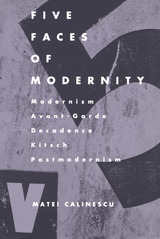2 books by Calinescu, Matei

Five Faces of Modernity
Modernism, Avant-garde, Decadence, Kitsch, Postmodernism
Matei Calinescu
Duke University Press, 1987
Five Faces of Modernity is a series of semantic and cultural biographies of words that have taken on special significance in the last century and a half or so: modernity, avant-garde, decadence, kitsch, and postmodernism. The concept of modernity—the notion that we, the living, are different and somehow superior to our predecessors and that our civilization is likely to be succeeded by one even superior to ours—is a relatively recent Western invention and one whose time may already have passed, if we believe its postmodern challengers. Calinescu documents the rise of cultural modernity and, in tracing the shifting senses of the five terms under scrutiny, illustrates the intricate value judgments, conflicting orientations, and intellectual paradoxes to which it has given rise.
Five Faces of Modernity attempts to do for the foundations of the modernist critical lexicon what earlier terminological studies have done for such complex categories as classicism, baroque, romanticism, realism, or symbolism and thereby fill a gap in literary scholarship. On another, more ambitious level, Calinescu deals at length with the larger issues, dilemmas, ideological tensions, and perplexities brought about by the assertion of modernity.
Five Faces of Modernity attempts to do for the foundations of the modernist critical lexicon what earlier terminological studies have done for such complex categories as classicism, baroque, romanticism, realism, or symbolism and thereby fill a gap in literary scholarship. On another, more ambitious level, Calinescu deals at length with the larger issues, dilemmas, ideological tensions, and perplexities brought about by the assertion of modernity.
[more]

Youth Without Youth
Mircea Eliade
University of Chicago Press, 2007
Bucharest, 1938: while Hitler gains power in Germany, the Romanian police start arresting students they suspect of belonging to the Iron Guard. Meanwhile, a man who has spent his life studying languages, poetry, and history—a man who thought his life was over—lies in a hospital bed, inexplicably alive and miraculously healthy, trying to figure out how to conceal his identity.
At the intersection of the natural and supernatural, myth and history, dream and science, lies Mircea Eliade’s novella. Now in its first paperback edition, the psychological thriller features Dominic Matei, an elderly academic who experiences a cataclysmic event that allows him to live a new life with startling intellectual capacity. Sought by the Nazis for their medical experiments on the potentially life-prolonging power of electric shocks, Matei is helped to flee through Romania, Switzerland, Malta and India. Newly endowed with prodigious powers of memory and comprehension, he finds himself face to face with the glory and terror of the supernatural. In this surreal, philosophy-driven fantasy, Eliade tests the boundaries of literary genre as well as the reader’s imagination.
Suspenseful, witty, and poignant, Youth Without Youth illuminates Eliade’s longing for past loves and new texts, his erotic imagination, and his love of a thrilling mystery. It was adapted for the screen in 2007 as Francis Ford Coppola’s first feature film in over ten years.
“A wonderful blend of realism, surrealism, and fantasy, [Eliade’s novellas] suggest the importance of the mythic and the supernatural to finding meaning in the everyday. Highly recommended.” —Library Journal
“Youth Without Youth reads like a surreal collaboration by Jorge Luis Borges, Kurt Vonnegut, Jr., and Carl Jung. Mircea Eliade left me with the rare sense that I had been entertained by a genius.”—William Allen, author of Starkweather and The Fire in the Birdbath and Other Disturbances
At the intersection of the natural and supernatural, myth and history, dream and science, lies Mircea Eliade’s novella. Now in its first paperback edition, the psychological thriller features Dominic Matei, an elderly academic who experiences a cataclysmic event that allows him to live a new life with startling intellectual capacity. Sought by the Nazis for their medical experiments on the potentially life-prolonging power of electric shocks, Matei is helped to flee through Romania, Switzerland, Malta and India. Newly endowed with prodigious powers of memory and comprehension, he finds himself face to face with the glory and terror of the supernatural. In this surreal, philosophy-driven fantasy, Eliade tests the boundaries of literary genre as well as the reader’s imagination.
Suspenseful, witty, and poignant, Youth Without Youth illuminates Eliade’s longing for past loves and new texts, his erotic imagination, and his love of a thrilling mystery. It was adapted for the screen in 2007 as Francis Ford Coppola’s first feature film in over ten years.
“A wonderful blend of realism, surrealism, and fantasy, [Eliade’s novellas] suggest the importance of the mythic and the supernatural to finding meaning in the everyday. Highly recommended.” —Library Journal
“Youth Without Youth reads like a surreal collaboration by Jorge Luis Borges, Kurt Vonnegut, Jr., and Carl Jung. Mircea Eliade left me with the rare sense that I had been entertained by a genius.”—William Allen, author of Starkweather and The Fire in the Birdbath and Other Disturbances
[more]
READERS
Browse our collection.
PUBLISHERS
See BiblioVault's publisher services.
STUDENT SERVICES
Files for college accessibility offices.
UChicago Accessibility Resources
home | accessibility | search | about | contact us
BiblioVault ® 2001 - 2024
The University of Chicago Press









